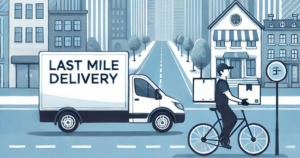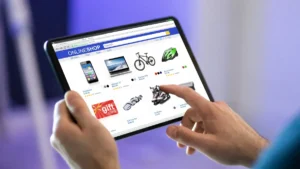It’s often quoted that the retail sector is the backbone of the UK’s economy. Given it employs over 4.9 million people, it’s easy to see why. But it’s also true that while it’s an economic powerhouse, it’s also a major polluter, especially with the rapid growth of e-commerce over the last decade.
The changes in how consumers want to shop have led to an exponential increase in van journeys, particularly in urban areas. It has had a notable impact on carbon emissions and air quality.
With the continued rise of retail-related deliveries and returns, Statistica predicts that carbon emissions from e-commerce logistics will hit around 25 million metric tonnes by 2030.
Green delivery next big challenge
The industry is facing mounting pressure from both the government and increasingly environmentally conscious consumers to adopt more sustainable business practices.
We know that a lot of brands and retailers are already looking into the production of the products in their supply chain as a priority.
Unless they take action on the challenges associated with urban delivery, the UK is unlikely to meet its net-zero targets. Fashion brands and retailers have a big part to play in changing this.
The current narrative often positions electric vehicles (EVs) as the answer. While EVs do offer some environmental benefits, they’re not a foolproof solution.
Not only do they have high embodied emissions, but they do little to alleviate congestion, so relying solely on them is not going to help retail businesses become inherently more sustainable, nor is it going to get us to net zero.
Watch: E-bikes making cities greener
Cargo bikes drive the future
I’m a firm believer that the path forward demands a radical reimagination of urban delivery. One that transcends the limitations of traditional models and moves away from delivery vans, either electric or diesel, altogether.
Retail giants such as Zara and Veja are already leading the way by adopting more innovative inner-city delivery methods that significantly reduce carbon emissions at the source through the use of cargo bikes.
By replacing vans or trucks with cargo bikes – electrically assisted pedal-operated cycles with plenty of storage space for packages – retail businesses can reduce their emissions by more than 80% compared with electric vehicles and more than 90% on diesel vans, Zedify’s impact research shows.
Cargo bikes are also incredibly versatile and efficient for city logistics. They can easily navigate through congested streets and narrow alleys where vans might struggle, ensuring timely and reliable deliveries.
This agility not only enhances delivery efficiency but also reduces congestion, another significant contributor to urban pollution.
Committing to sustainability
In the age of e-commerce, delivery also represents the pinnacle of customer interaction, shaping perceptions and influencing brand loyalty.
Cargo bikes offer a unique opportunity to showcase a brand’s true commitment to sustainability, while also elevating the customer experience.
Given we know that 50% of UK retail businesses admitted to losing customers because of a poor delivery experience last year, this is a major factor in why their popularity is increasing.
The economic reasons behind this shift are equally compelling. Traditional urban delivery methods entail significant operational costs, from fuel expenses to vehicle maintenance and congestion and clean air charges in some cities.
By contrast, cargo bikes are a cost-effective alternative, requiring minimal maintenance and operating costs.

A greener tomorrow
By addressing last-mile logistics, retail businesses can significantly reduce the environmental impact of their operations, improve customer relationships, and drive profitability.
This is why we are seeing so much interest from fashion brands and retailers across the UK seeking to transform their urban delivery.
But more than that, by uniting as an industry and reimagining urban delivery, we can transform our cities into healthier and more sustainable spaces where every delivery embodies a commitment to a greener future.
NOW READ: Greener last-mile delivery with Zedify’s approach in busy cities











